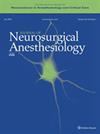成人创伤性脑损伤后心肌损伤和心功能障碍的发生率:系统回顾和元分析
IF 2.3
2区 医学
Q2 ANESTHESIOLOGY
引用次数: 0
摘要
创伤性脑损伤(TBI)后的心肌损伤和心功能障碍在观察性研究中已有报道,但对其发生率还没有可靠的估计。我们进行了一项系统性回顾和荟萃分析,以估计创伤性脑损伤成年患者心肌损伤和心功能不全的总发生率。我们使用 MEDLINE 和 EMBASE 数据库对从开始到 2022 年 11 月的文献进行了检索。如果观察性研究报告了至少一项异常心电图发现、心肌肌钙蛋白水平升高或对创伤性脑损伤成年患者的收缩功能或左心室壁运动进行超声心动图评估,则将其纳入研究范围。根据原始研究,心肌损伤定义为心肌肌钙蛋白水平升高,心功能不全定义为左室射血分数<50%或超声心动图评估的区域室壁运动异常。采用随机效应模型对心肌损伤和心功能不全的汇总发病率进行了荟萃分析。创伤后心肌损伤的汇总估计发生率(17 项研究,3773 名参与者)为 33%(95% CI:27%-39%,I 2:s 93%),创伤后心功能障碍的汇总估计发生率(9 项研究,557 名参与者)为 16.%(95% CI:9%-25.%,I 2:84%)。尽管不同研究之间存在明显的异质性,心肌损伤和心功能不全的发生率也可能被高估,但我们的研究结果表明,约三分之一的成年人在创伤后会出现心肌损伤,约六分之一的创伤后患者会出现心功能不全。本文章由计算机程序翻译,如有差异,请以英文原文为准。
Incidence of Myocardial Injury and Cardiac Dysfunction After Adult Traumatic Brain Injury: A Systematic Review and Meta-analysis
Myocardial injury and cardiac dysfunction after traumatic brain injury (TBI) have been reported in observational studies, but there is no robust estimate of their incidences. We conducted a systematic review and meta-analysis to estimate the pooled incidence of myocardial injury and cardiac dysfunction among adult patients with TBI. A literature search was conducted using MEDLINE and EMBASE databases from inception to November 2022. Observational studies were included if they reported at least one abnormal electrocardiographic finding, elevated cardiac troponin level, or echocardiographic evaluation of systolic function or left ventricular wall motion in adult patients with TBI. Myocardial injury was defined as elevated cardiac troponin level according to the original studies and cardiac dysfunction was defined as the presence of left ventricular ejection fraction <50% or regional wall motion abnormalities assessed by echocardiography. The meta-analysis of the pooled incidence of myocardial injury and cardiac dysfunction was performed using random-effect models. The pooled estimated incidence of myocardial injury after TBI (17 studies, 3,773 participants) was 33% (95% CI: 27%-39%, I 2:s 93%), and the pooled estimated incidence of cardiac dysfunction after TBI (9 studies, 557 participants) was 16.% (95% CI: 9%-25.%, I 2: 84%). Although there was significant heterogeneity between studies and potential overestimation of the incidence of myocardial injury and cardiac dysfunction, our findings suggest that myocardial injury occurs in approximately one-third of adults after TBI, and cardiac dysfunction occurs in approximately one-sixth of patients with TBI.
求助全文
通过发布文献求助,成功后即可免费获取论文全文。
去求助
来源期刊
CiteScore
6.20
自引率
10.80%
发文量
119
审稿时长
>12 weeks
期刊介绍:
The Journal of Neurosurgical Anesthesiology (JNA) is a peer-reviewed publication directed to an audience of neuroanesthesiologists, neurosurgeons, neurosurgical monitoring specialists, neurosurgical support staff, and Neurosurgical Intensive Care Unit personnel. The journal publishes original peer-reviewed studies in the form of Clinical Investigations, Laboratory Investigations, Clinical Reports, Review Articles, Journal Club synopses of current literature from related journals, presentation of Points of View on controversial issues, Book Reviews, Correspondence, and Abstracts from affiliated neuroanesthesiology societies.
JNA is the Official Journal of the Society for Neuroscience in Anesthesiology and Critical Care, the Neuroanaesthesia and Critical Care Society of Great Britain and Ireland, the Association de Neuro-Anesthésiologie Réanimation de langue Française, the Wissenschaftlicher Arbeitskreis Neuroanästhesie der Deutschen Gesellschaft fur Anästhesiologie und Intensivmedizen, the Arbeitsgemeinschaft Deutschsprachiger Neuroanästhesisten und Neuro-Intensivmediziner, the Korean Society of Neuroanesthesia, the Japanese Society of Neuroanesthesia and Critical Care, the Neuroanesthesiology Chapter of the Colegio Mexicano de Anesthesiología, the Indian Society of Neuroanesthesiology and Critical Care, and the Thai Society for Neuroanesthesia.

 求助内容:
求助内容: 应助结果提醒方式:
应助结果提醒方式:


